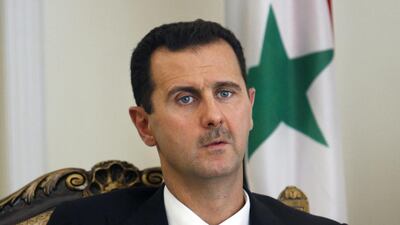More than four years into the Syrian quagmire, the question of how to deal with the regime of Bashar Al Assad continues to be raised: as a partner against ISIL or as part of the problem.
The Syria question has taken on new urgency in recent weeks. The refugee crisis is one part of that, while the news that Moscow is building up its military support for the regime is another. Certainly, the Russians have concluded that it is indispensable. Should the rest of the world do the same?
There are a number of arguments in favour of the Syrian government in this regard. The first is that they are waging a war against ISIL, the most brutal and vicious group in the world. Even if one believes that the regime has carried out atrocities, it is still better than ISIL. Another argument is that Mr Al Assad is defending the old, historical and pluralistic society of Syria as opposed to ISIL, which is trying to destroy that.
However, when it comes to numbers, there is little on Mr Al Assad’s side. While the precise number of those killed in Syria is difficult to verify, it is clear that Mr Al Assad’s forces have been responsible for the vast majority of civilian deaths. There is no doubt that ISIL has ruthlessly murdered Syrians, but the barrel bombs that Mr Al Assad’s forces have been accused of using have claimed many more lives than ISIL did.
If the choice has to be made between the two, then those who kill more ought to be targeted more seriously. This is why the regime has to be the primary target. Yet this is not the strongest argument.
The proclaimed objective of the international community in Syria is two-fold: one is to put an end to the ISIL phenomenon as well as other radical extremists; the other is to protect Syrian civilians under an enduring and sustainable state structure. Is ISIL a good candidate for any of that? The answer is clearly no. But the choice is not between ISIL, other radical groups and the regime – that is a false choice.
After all, it was the regime that unleashed a number of extremists in 2011, many of whom joined anti-Assad groups. That, in turn, allowed the Syrian government to argue that it was not fighting a grass roots movement seeking a positive change, but rather a terrorist insurgency. Damascus’s repression and brutality furthermore made it easier for radical groups to recruit members, both inside and outside Syria. If Mr Al Assad is a friend in the war against ISIL, one wonders what an enemy would look like.
Another question is this: what would be the repercussions of aligning with Mr Al Assad in terms of relations between Syrians and the West? Much of the Syrian population already feels that most of the West is far more concerned with ISIL than it is with the regime, although it is Mr Al Assad’s forces that are killing far more Syrians than these terrorists. If the West were to openly align with Mr Al Assad, then what sort of message would that send to Syrians at large?
Syrian refugees arriving in Europe might be already aware of the crass Islamophobia some European politicians suffer from, such as Hungary’s prime minister who said: “I think we have a right to decide that we do not want a large number of Muslim people in our country.” Do Europeans really want to send a further message that they stand alongside a brutal dictator like Mr Al Assad? At the very least, it would put to rest any notion that the West’s fundamental values mean anything in terms of its foreign policy decisions. The choice is not between the regime and ISIL. Mr Al Assad is a much greater threat than ISIL, because his policies make it far more likely that ISIL will continue. Indeed, other groups may emerge as a result of Damascus’s choices.
The international community is right to recognise that what is at stake in Syria is its existence as a pluralistic society, with a stable and enduring structure of government. If they are serious, then they ought to recognise that the best way – perhaps the only way – to rescue what is left of Syria is to identify that neither Mr Al Assad nor ISIL can be a part of any solution.
There is a way to maintain the integrity of Syria as a country, take the battle to ISIL and ensure that Syrian civilians are protected. Mr Al Assad and his government are not allies in that regard – at the very least, they are obstacles. At most, they are parts of the problem. The question is not if Mr Al Assad is the lesser evil. The real question is whether the international community is truly willing to commit its resources to ending this nightmare for Syrians. That means investing serious resources to ensure a post-Assad transition, as opposed to just watching the disaster endure from the sidelines.
Dr HA Hellyer is an associate fellow in international security studies at the Royal United Services Institute in London, and the Centre for Middle East Policy at the Brookings Institution in Washington, DC
On Twitter: @hahellyer


